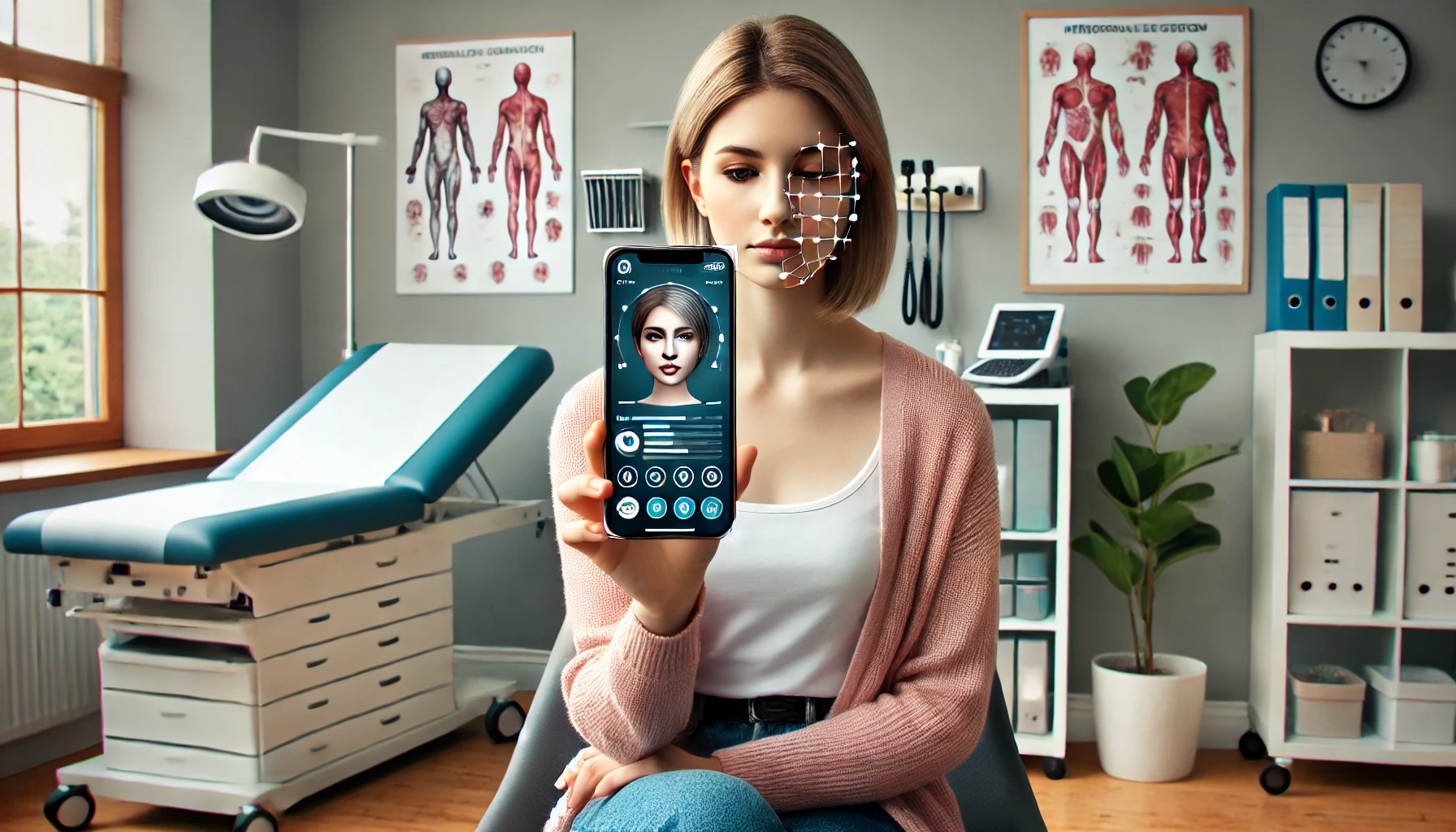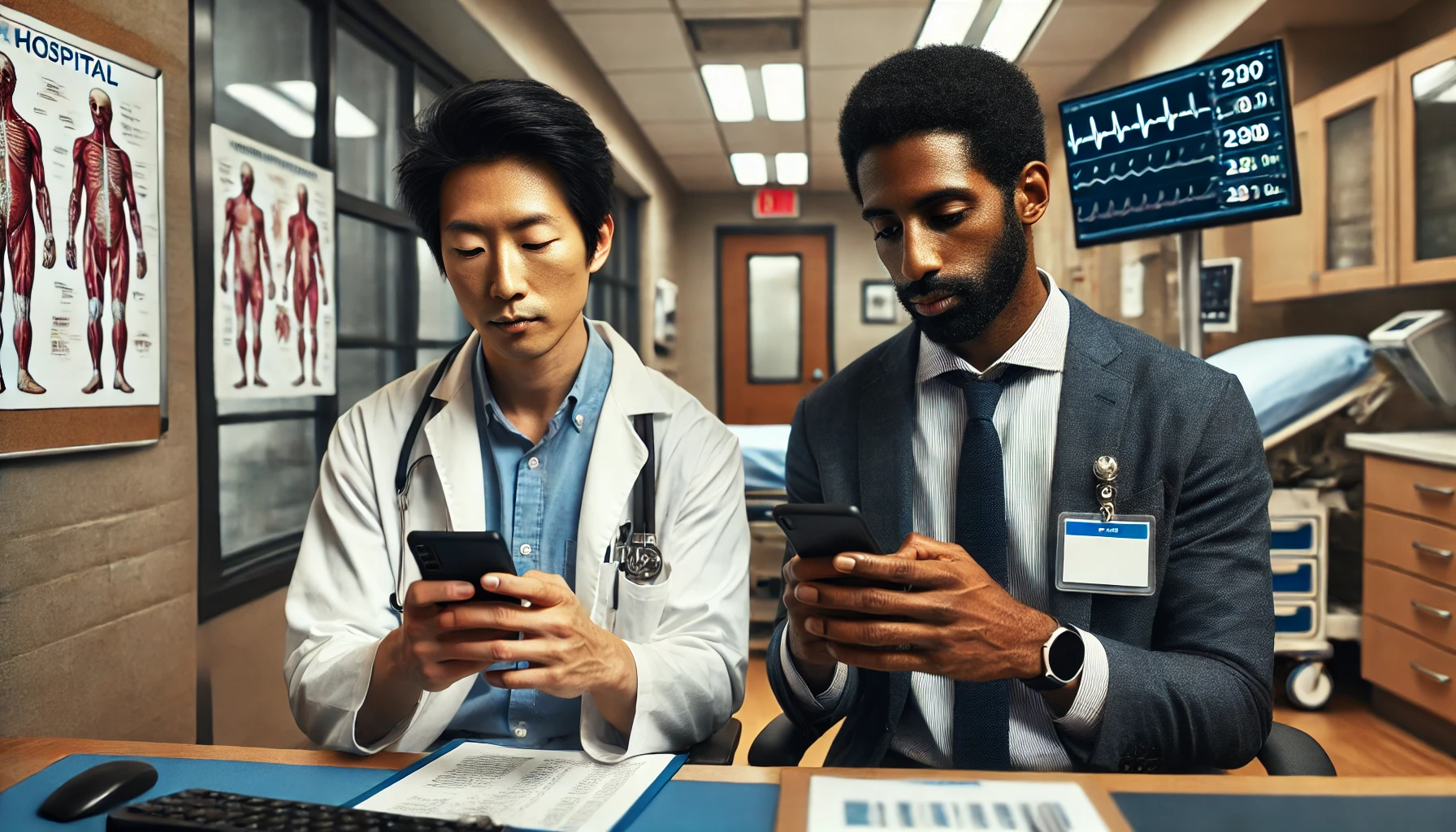The humble phone has undergone a remarkable transformation. From the bulky black telephones of the past to the sleek, multifunctional touchscreen smartphones we hold today, each change has brought us closer to a future where technology seamlessly integrates with our lives.
Now, adding in Artificial Intelligence (AI), these devices are poised to become even smarter, especially in the medical field. But what is “AI” exactly?
AI refers to a branch of computer science focused on developing machines that can mimic human cognitive functions. Simply put, AI are machines that try to imitate human thinking.
And when it comes to healthcare, AI apps leverage this technology to automate tasks, improve medical decision-making, and personalize a doctor’s experience. Think about an app that can analyze patient data and suggest treatment options, freeing up the doctor’s time for more complex cases. Or picture an app that helps doctors visualize a patient’s anatomy through 3D reconstructions, improving diagnostic accuracy.
These are just a few examples of how AI is positioned to revolutionize the way doctors practice medicine.
But AI isn’t just about futuristic scenarios. There are already numerous AI-powered apps available on smartphones, offering doctors a range of functionalities for use professionally and personally.
Let’s explore the top three AI apps in Android and IOS that doctors use in their smartphones:
Table of Contents
StarryAI
StarryAI isn’t your typical medical app. Instead, it focuses on artistic creation.
Doctors often need to create presentations for conferences or patient education. StarryAI allows them to describe a desired image, like “a healthy heart cell fighting off a virus” or “a calm patient meditating in a garden.”
The app then uses its AI capabilities to generate unique, visually striking images that can enhance presentations and patient engagement.
| Pros: | Creates original, eye-catching visuals for presentations with minimal effort. |
| Cons: | The artistic interpretations might not always be medically accurate and may require adjustments. |
| Pricing: | Free trials are available, but subscriptions starting at $11.99/month are necessary for continued use. |
Uses Beyond Medicine
Let your creativity flow! StarryAI can be used to generate artwork for personal projects, greeting cards, or even unique home décor. You can try creating a piece depicting your dream vacation or a personalized portrait of your pet.
Lensa AI

Lensa AI offers a suite of photo editing tools powered by AI. Doctors can use it to enhance patient photographs for medical records or research projects.
The app also boasts a unique feature: generating personalized avatars from portraits. Imagine customizing a patient avatar to explain a complex medical procedure or disease process in a more engaging way.
| Pros: | Offers advanced photo editing tools and the ability to create unique avatars for patient education. |
| Cons: | Certain features require in-app purchases. There are also privacy concerns regarding patient data used in avatar creation, which doctors need to be mindful of. |
| Pricing: | Free for basic photo editing with upgrades starting at $2.16 per month for full feature access. |
Uses Beyond Medicine
Breathe new life into your personal photos! Lensa AI’s editing tools can enhance your favorite vacation pictures, family portraits, or even old photographs. The avatar feature can also be used for personal amusement.
Create an avatar of yourself in a fantastical setting or a different artistic style – the perfect addition to your social media profile or a fun conversation starter.
ChatGPT

Of course, it wouldn’t be a legit AI list without this most used AI tool. ChatGPT is a chatbot powered by AI that allows users to have natural language conversations.
Doctors can utilize it for research purposes, asking the AI specific medical questions or requesting summaries of complex medical studies. Additionally, ChatGPT can be used to gather information from patients through a chatbot interface, potentially improving communication and efficiency.
But to use ChatGPT correctly, you need great prompts. We have our FREE ChatGPT prompt generator that will help you make awesome prompts for whatever you want. Try it out!
| Pros: | Provides a convenient way to research medical topics and potentially streamline patient interaction. |
| Cons: | The information provided by ChatGPT should NOT be solely relied upon for diagnosis or treatment decisions. Additionally, the accuracy of the chatbot’s responses depends on the quality of data it has been trained on. As always, do your due diligence! |
| Pricing: | Free up to version 3.5, while ChatGPT Plus which is faster and has access to GPT-4 starts at $20/month. |
Also, great news for iPhone users! ChatGPT is planned to be integrated into the next IOS version. That means you might not need to download it.
We talk more about it here: Apple Intelligence: Everything About IOS 18 Powered With ChatGPT. Check it out!
Uses Beyond Medicine
ChatGPT can be your personal research assistant! Have a burning question about history, science, or even pop culture? ChatGPT can help you find answers and explore new topics. Stuck on a creative project? Use ChatGPT to brainstorm ideas or generate different writing prompts.

Subscribe to receive the 7 Steps you can follow to achieve Financial Freedom
If financial freedom is your goal, there’s no better time to get started than right now.
Unlock actionable steps that you can take every day to fine-tune your goals, discover your interests, and avoid costly mistakes on your financial freedom journey.
Conclusion
AI tools in the medical field are still in their early stages. However, the potential for improvement and innovation is vast. As these technologies evolve, we can expect even more sophisticated applications that will further streamline workflows, enhance diagnosis and treatments, and ultimately improve patient care.
It’s important to acknowledge that AI tools are not without their limitations. They can make mistakes, and responsible development is crucial as this technology progresses. Doctors need to be discerning users, employing AI tools as supplements to their expertise, not replacements. Like we always say, do your due diligence!
We’ve shown a few ways AI tools are impacting doctors and healthcare. What are your thoughts on these advancements? Do you have experience using a specific AI app for medical purposes? We’d love to hear from you!
Stay tuned for further updates on how AI continues to change the way we do healthcare. Subscribe to our newsletter for exclusive insights, industry trends, and practical tips on leveraging AI in your practice.
You can also visit our AI resource page for a treasure trove of valuable tools and information. See you again!
IF YOU WANT MORE CONTENT LIKE THIS, MAKE SURE YOU SUBSCRIBE TO OUR NEWSLETTER TO GET UPDATES ON THE LATEST TRENDS FOR AI, TECH, AND SO MUCH MORE.
Peter Kim, MD is the founder of Passive Income MD, the creator of Passive Real Estate Academy, and offers weekly education through his Monday podcast, the Passive Income MD Podcast. Join our community at the Passive Income Doc Facebook Group.
Further Reading
